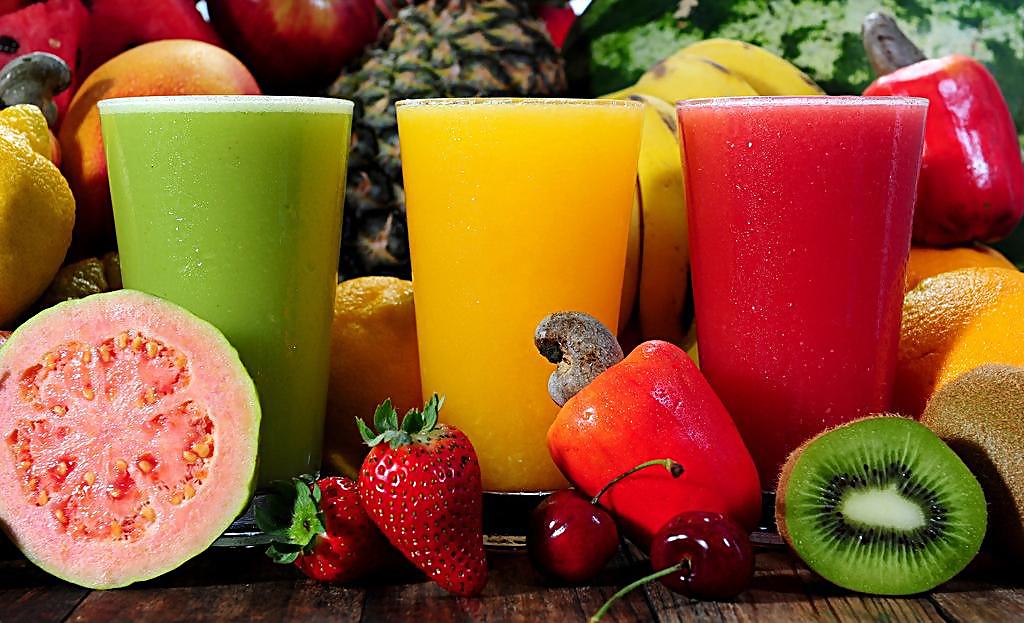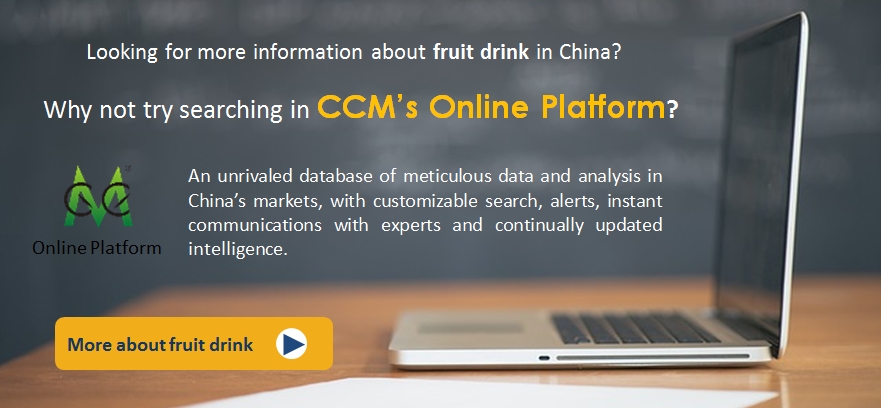Under
the slowdown of the domestic beverage
industry, the fruit drinks industry has maintained strong development. The
market of average and high concentrate fruit
drinks has great development potential with the changes to consumption
habits and the adjustment of the beverage consumption structure. Moreover,
functional drinks and fruit drinks which are natural and healthy will be
preferred by domestic consumers.

Source: Baidu
In the past few years,
the domestic beverage industry has had its development restrained by
bottlenecks. In Q1-Q3 2015, the sales volume of domestic beverages reached about
130 million tonnes, up by 4% YoY.
In 2014, the sales
volume increased by 13% YoY. In 2001-2011, the average annual growth rate was
over 20%. With the slowing growth of the beverage industry, fruit drinks,
especially 100% fresh fruit juice, will become the new area of growth in the
beverage industry.
Overcapacity
in the beverage industry
During the
"Golden Ten Years" development period for the beverage industry in
the 21st century, which was characterized with increasing sales
volumes, many beverage enterprises expanded their production capacity. However,
much of this newly added production capacity was added in anticipation of high
sales volume growth. A huge imbalance between the expanded capacity and the
weak demand has appeared because of the slowing sales volume growth.
The beverage industry
is encumbered with overcapacity, stated Zhu Danpeng, researcher at the
National Institution for Food Business. China Huiyuan Juice Group (Huiyuan)
sold nine of its subsidiaries in H1 2015, which is indicative of the current
situation of the beverage industry.
The growth of domestic
beverage market is obviously slowing down with the intense competition. More
beverage products are coming into the market and the available range is
continually changing. Average gross profits have declined due to the weak
demand, the increasing costs and the intense competition in the industry. As a
result, beverage enterprises are facing declines in both their revenues and
profits.
The slowdown of the
global economy is the main reason for the weak demand in the beverage market.
With the expansion of the overall beverage production capacity, the beverage
market will be saturated and the competition within the industry will
intensify. Thus, the development of the beverage industry will inevitably slow
down.

Fruit
drinks have strong development potential
Fruit drinks are
developing strongly. The average consumption volume of fruit drinks in China is
far behind that in developed countries. Therefore, there is a bright future for
the fruit drinks industry.
Estimates of the
potential market scale of 100% fresh fruit juice in China are based on the
sales volume of 100% fresh fruit juice in the US. In the US fruit drinks
market, fruit flavored beverages and fruit pulp beverages account for 31% and
9% of the market share respectively, while 100% fresh fruit juice accounts for
60% of the market. 100% fresh fruit juice is very popular with consumers
because of their high nutrition value and rich flavors. In contrast,
Chinese consumers still prefer fruit flavored beverages and fruit pulp
beverages, which together account for 95% of the market. 100% fresh fruit juice
has captured only 5% of the market.
The domestic fruit
drinks market will remain quite good in its growth while the market of 100%
fresh fruit juice will not skyrocket in the short term. However, with changes
to consumption habits and the adjustment of the beverage consumption structure,
the market for average and high concentration fruit drinks has a bright future.
In addition, NFC (Not
from Concentrate) juice, as the new hottest product in the market, can only be
found in a few brands like Summi (a brand under China Tianyi Holdings Ltd., a
juice enterprise in China) and LingDuGuoFang (a Chinese brand that focuses on
producing NFC juice). NFC Juice is 100% freshly squeezed from the fruit without
adding any water.
As the pioneer in the
NFC juice market, LingDuGuoFang began to sell NFC juice in China in 2011. The
NFC juice of Summi, which is very popular with young consumers, can be seen in
many supermarkets and cafés in Beijing, Shanghai and Guangzhou.
Various
kinds of fruit drinks but not enough high-end products
Currently, the following
fruit drinks can be seen in the market.
-
Fruit drinks with low
concentration of 5%-10%, such as "Orangeate" from Uni-President China
Holding Ltd., "Daily C" from Master Kong Holding Ltd. and
"Qoo" from Coca-cola Company.
-
Mixed juices with a
concentration of 30% that contains mixtures of different fruit and vegetable
juices, such as "Mr. Juicy" from A.S. Watson Group (Hong Kong) Ltd.
-
Fruit pulp beverages
with over 40% concentration. It is made with fruit pulps or concentrated pulps,
sugar and acidifier, which contains a lot of pulps, fruit fiber and pectin.
Chinese consumers
still prefer fruit drinks with low concentration. However, it is already a
consensus within the industry that the consumers are becoming more and more
interested in fruit drinks with high concentration.
Natural,
healthy and functional beverages will be the leading products in the future
According to Nielson,
in 2015, the average growth of functional drinks surpassed the growth of
ordinary beverages in the domestic beverage market. Consumers are becoming more
discerning on the beverages that they consume. Fruit drinks, as a natural and
healthy choice, are becoming more attractive. The beverage industry no longer
bombards the market with advertisements, since this practice has become
ineffective because more consumers prefer beverages of high quality and are
reasonably priced.
The healthy beverage
industry needs further development. It may have rapid development within 3
years. Natural ingredients are being favored and have great potential.
Beverages like protein beverages, fruit drinks and herbal drinks are predicted
to be leading products in the future. The drinks like sea buckthorn juice,
blueberry drinks, coconut juice, orange juice and apple vinegar drinks will
become popular products in the market.
Furthermore, with the
increasing range of functional beverages, fruit drinks may incorporate the
dietary functions of the dairy products. Vitamins and minerals will be added
into fruit drinks. Thus, the boundaries between fruit drinks and dairy
beverages, fruit drinks and energy beverages, will become more ambiguous.

About
CCM:
CCM is the leading market intelligence provider for
China’s agriculture, chemicals, food & ingredients and life science
markets. Founded in 2001, CCM offers a range of data and content solutions,
from price and trade data to industry newsletters and customized market
research reports. Our clients include Monsanto, DuPont, Shell, Bayer, and
Syngenta. CCM is a brand of Kcomber Inc.
For more information about CCM, please visit www.cnchemicals.com or get in touch
with us directly by emailing econtact@cnchemicals.com or
calling +86-20-37616606.
Tag: fruit
drinks